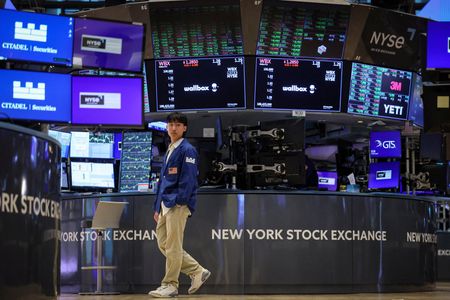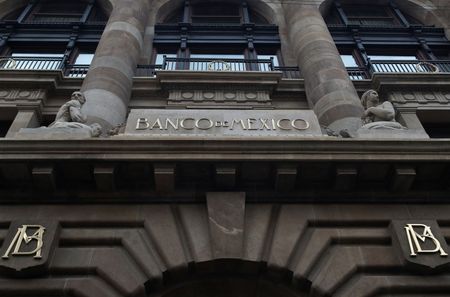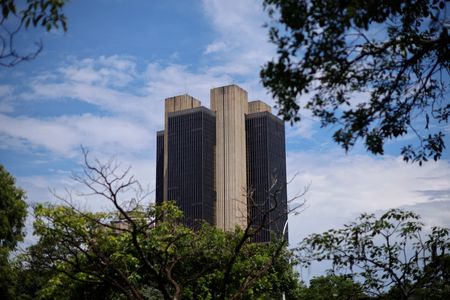By Stephen Culp
NEW YORK (Reuters) -All three major U.S. stock indexes lost ground on Thursday, weighed by technology shares, as Treasury yields rose on easing recession fears and global central bank officials convened at the Jackson Hole Economic Symposium.
The so-called Magnificent Seven megacap growth stocks weighed heaviest on the tech-laden Nasdaq.
“There doesn’t appear to be any kind of clear catalyst as to what’s driving this sell-off,” Scott Ladner, chief investment officer at Horizon Investments in Charlotte, North Carolina.
“People may be trying to square positions a little bit ahead of Nvidia (earnings) next week, or risk-out ahead of (U.S.
Federal Reserve Chair Jerome) Powell’s Jackson Hole speech tomorrow.”
Central bank officials from around the world have gathered in Jackson Hole for the annual Economic Symposium. Investors will be laser focused on Powell’s address on Friday for clues on the timing and extent of the Fed’s policy easing cycle.
Powell is expected to assure the markets that the Fed will cut rates in September, Ladner said.
“He’ll be coy with the question about whether it’s going to be a 25 or 50 basis point cut, but will probably try to lead the market towards 25.”
“He will say he expects to start slow but will also emphasize that if they do see any further weakness in the labor market they can speed things up,” Ladner added.
News of increasing U.S.
jobless claims, following Wednesday’s sharply lower benchmark payrolls revision, appear to confirm the labor market is less robust than expected and is gradually softening. This soothed recession fears while bolstering the case for a 25 basis point rate cut at the Fed’s upcoming September policy meeting.
That sentiment was echoed in remarks on Thursday from Kansas City Fed President Frank Schmid, Boston Fed President Susan Collins, and Philadelphia Fed President Patrick Harker, all of whom indicated that a rate-cutting phase is shortly forthcoming.
“What Fed officials are saying is a rate cut is definitely on the table, but there’s still time between now and September and data can move things,” Martin said.
The Dow Jones Industrial Average fell 177.71 points, or 0.43%, to 40,712.78.
The S&P 500 lost 50.21 points, or 0.89%, at 5,570.64 and the Nasdaq Composite dropped 299.63 points, or 1.67%, to 17,619.35.
The CBOE Volatility index, often viewed as a barometer of investor anxiety, breached 18, the highest intraday reading in a week, before settling at 17.56.
Among the 11 major sectors of the S&P 500, technology suffered the largest percentage loss, falling 2.1%. Real estate stocks led the gainers.
Among individual stocks, Snowflake raised its forecast for full-year product revenue.
Even so, the data cloud analytics firm’s shares slid 14.7% as its margin forecast remained unchanged.
Zoom Video Communications jumped 13.0% after raising its annual revenue forecast.
Advance Auto Parts tumbled 17.5% after trimming its annual profit forecast.
Declining issues outnumbered advancing ones on the NYSE by a 2.16-to-1 ratio; on Nasdaq, a 2.25-to-1 ratio favored decliners.
The S&P 500 posted 58 new 52-week highs and one new low; the Nasdaq Composite recorded 83 new highs and 68 new lows.
Volume on U.S. exchanges was 9.79 billion shares, compared with the 11.89 billion average for the full session over the last 20 trading days.
(Reporting by Stephen Culp; Additional reporting by Shashwat Chauhan and Johann M Cherian in Bengaluru; Editing by Richard Chang)











